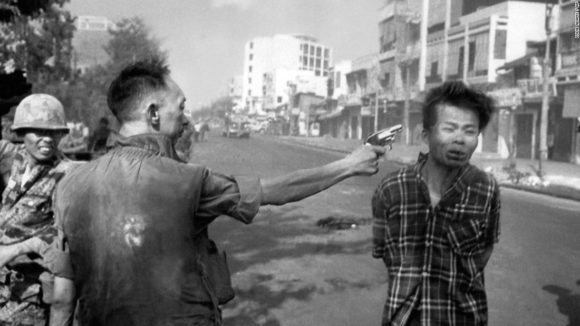The Vietnam documentary that aired on PBS over the last two weeks — 18 hours, Ken Burns executive producer — is getting trashed by the left. The critics say that the documentary is killing history (in John Pilger’s words), that it misrepresents our leaders’ intentions as good, that it fails to humanize the Vietnamese, and fails to convey the scope of American atrocities/destruction. Close friends of mine won’t watch it. “I’m afraid too much emphasis will be placed on 55,000 Americans, important as they are, and not enough on 1.5 million dead Vietnamese,” says James North. My wife says she already knows the story. (Her first husband was a C.O. in Vietnam and his exposure to Agent Orange surely shortened his life.)
I don’t care. When I flipped the station to PBS in recent days, I found myself rooted to the spot for the next 90 minutes, screaming at the television, at Lyndon Johnson and Robert McNamara and Nixon and Kissinger. I was completely caught up in the everyman human dramas that Burns and co-director Lynn Novick established: What journey is Carol Crocker, from Saratoga Springs, setting out on after her beloved brother, Denton “Mogie” Crocker, is killed at 19? How will Bill Earhart come to terms with the fact that he traded C Rations for sex with a Vietnamese woman along with two buddies in Hue in 1968?
I am aware that Burns is an extremely conventional narrator, most interested in white men; I don’t care. The sequence of events is artless and predictable, and the narration is absent sensibility, and I don’t care. I know this is not a scholarly history, or a politically or intellectually rigorous one, and I don’t care. I know that the documentary is indifferent to History with a capital H. I observe the documentarians’ racist choices; Kent State is lingered over, Jackson State gets a line; and I shrug. I wish that there had been a real effort to humanize the Vietnamese victims of our imperialist aggression– the effort feels forced– and I still don’t care. I watch the filmmakers fall in love with John Kerry and fail all the stories that Bao Ninh, a Vietnamese novelist, begins to open to them, before the jump-cut– well, too bad.

Bao Ninh
The majesty of this documentary, and it is majestic, is its visual impact: all the clips that the producers have dug up and sampled. The viewer is experiencing a central event of American history “as it happened” — that cathartic illusion, with moving interventions by Tim O’Brien and Earhart and John Musgrave, along with a second string of Vietnamese voices, notably Ninh.
No, it’s not the left forum, no it’s not “honest” about the ultimate causes of this suffering, or even who experienced most of it. But this is what a mainstream American production is going to do, and it does it well.
The power of this show is to demonstrate the folly of occupation and the horror of American war-making to people who don’t really know the history–myself included. I believe the critics are failing to recognize the visceral impact of this documentary as a movie. To quote my politician/contractor friend who lives in my small town and urged me to watch the documentary in the first place, 5 episodes in: “Can’t imagine the hate the Vietnamese had for us and the French. Can’t imagine living through that shit in any capacity. The USA is a monster with its history dripping in fucking blood.” That’s the message. Kudos to Burns and Novick.

Assassination by South Vietnamese general of alleged spy in 1968, Saigon, AP photo.
My jaw has been on the floor as the documentary unfolded iconic images of the war that I’d never comprehended because I’d been too young. The famous assassination of the alleged North Vietnamese spy on the street in Saigon by the South Vietnamese general, captured in the AP photo (above). Walter Cronkite’s broadcast after Hue–“it seems now more certain than ever, that the bloody experience of Vietnam is to end in a stalemate”–that helped change American attitudes. The destruction of Lyndon Johnson by the war. The My Lai massacre in 5 minutes of images… The horrifying story of Nick Ut’s photograph of napalm victim Kim Phuc in 1972 that was sent out on the wires notwithstanding her nakedness and undid the last meaningful supports for the war here. Jane Fonda’s visit to Hanoi… John Kerry’s testimony, the veterans’ medal toss at the Capitol…
These moments are told in brief and predictable chaplets of film, but they are told well.
As for the catharsis of this broadcast: Every moment of this documentary, however skewed to the American point of view, reminds us of the staunch refusal of a people to be subjugated even as their sons are annihilated, and of the murderous and passive arrogance of American leaders, their indifference to countless young people’s lives being snuffed out because their own political futures were at stake. And of course a majority of Americans supported those leaders even in 1972.
These are vital lessons. They shine a light on Iraq and Palestine and Iran– and Bush and Obama and Trump.
So have at it, critics. You are surely right about this documentary and still I watched, to learn about my country and history in a rudimentary and dramatic manner. I’m even going to catch the episodes I missed.
Source Article from http://mondoweiss.net/2017/10/cathartic-vietnam-documentary/
 RSS Feed
RSS Feed















 October 2nd, 2017
October 2nd, 2017  Awake Goy
Awake Goy  Posted in
Posted in  Tags:
Tags: 













